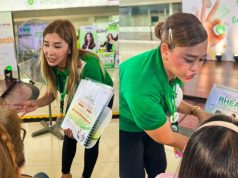
The Department of Health fact-checked several unverified information on COVID-19 circulating on social media amid the worsening situation on the health crisis in the country.
The Philippines recorded 15 new confirmed COVID-19 cases on Thursday bringing the total number to 217 with 17 fatalities.
Meanwhile, eight patients who have tested positive of the new pathogen have recovered.
Following these reports, the health agency recently noticed a number of questionable online posts that allegedly help in preventing the spread of the novel coronavirus.
Gargling with warm salt water
On Tuesday, the health agency disproved reports that gargling with warm salt water or vinegar can eliminate the new virus called Sars-CoV-2.
“There is no medical evidence that rinsing the throat with warm water and salt or vinegar will eliminate the virus that causes COVID-19,” the DOH said.
Fact Check: Ang ipinakikitang Advisory ay walang katotohanan. Walang ebidensya na ang pagmumog ng maligamgam na tubig na…
Posted by Department of Health (Philippines) on Tuesday, March 17, 2020
Presidential Spokesperson Salvador Panelo also recommended gargling with salt water during a press briefing last Monday.
“It has been my habit to gargle salt water. Whenever I feel a bit of colds, I do it,” Panelo said.
He also claimed the effectivity of eating bananas somewhere on the internet.
Health Undersecretary Eric Domingo said that the practice of gargling with salt water might be a good home remedy, but not to kill a virus.
“I don’t think there is any evidence that it will kill a virus. I think this is a home remedy that has been followed for many, many generations and I don’t think there’s going to be any harm in doing it,” he said.
DOH reiterated that the best defense against acquiring the illness is still the practice of social distancing and proper hygiene.
Use of ibuprofen or other pain killers
Some Filipino also shared posts cautioning the public against the use of popular painkillers such as ibuprofen to counter the symptoms of COVID-19, which are similar to that of other respiratory illnesses.
These posts stemmed from the advice of Olivier Veran, France’s health minister, who tweeted that ibuprofen could worsen the effects of the coronavirus strain.
The World Health Organization agreed with Veran’s advice.
“Based on currently available information, WHO does not recommend against the use of ibuprofen,” the organization said.
Q: Could #ibuprofen worsen disease for people with #COVID19?
A: Based on currently available information, WHO does not recommend against the use of of ibuprofen. pic.twitter.com/n39DFt2amF
— World Health Organization (WHO) (@WHO) March 18, 2020
Some scientists, however, challenged the recommendation to use ibuprofen, saying that there’s not enough data to back this up.
“There are multiple assumptions that are made with that hypothesis that can’t be made without being tested,” Angela Rasmussen, a scientist wwas quoted by Vox as saying.
As of March 18, the health department has yet to make an advisory about it.
“DOH is getting more information on this matter and is waiting for a formal advice from the WHO. Rest assured that the public will be updated through official DOH channels,” it said.
FACT CHECK: Stories have been circulating on line that Ibuprofen should not be used for managing symptoms of…
Posted by Department of Health (Philippines) on Wednesday, March 18, 2020
Is COVID-19 airborne or not?
A new study published on the medRxiv depository suggested that COVID-19 can remain in the air for up to three hours and live on surfaces, particularly those made of plastic and stainless steel, until three days.
Following this discovery, WHO later announced that they are considering “airborne precautions” for their medical staff.
“When you do an aerosol-generating procedure like in a medical care facility, you have the possibility to what we call aerosolize these particles, which means they can stay in the air a little bit longer,” Dr. Maria Van Kerkhove, head of WHO’s emerging diseases and zoonosis unit was quoted as saying in an article.
DOH similarly echoed that COVID-19 can be spread as droplets by sneezing and couging or aerosol through medical procedures.
FACT CHECK: Wala pang ebidensya na airbone ang COVID-19. Ang Kagawaran ng Kalusugan ay agad na magbibigay anunsyo sakalilng mayroon nang sapat na ebidensya para dito.
Posted by Department of Health (Philippines) on Tuesday, March 17, 2020
Health Undersecretary Maria Rosario Vergeire specifically clarified that it is only considered airborne in confined hospital settings.
“Ito pong artikulong ito ay tinutukoy nila mga setting ng ospital… So ‘yung airborne na sinasabi is in a confined hospital setting,” she said.
Other myths propagating online
Several other myths concerning the coronavirus not mentioned by the DOH have propagated online.
Among these were assumptions that COVID-19 can be transmitted less during certain types of weather, particularly during hot and humid weather.
“From the evidence so far, the COVID-19 virus can be transmitted in ALL AREAS, including areas with hot and humid weather. Regardless of climate, adopt protective measures if you live in, or travel to an area reporting COVID-19,” WHO said.
Faheem Younus, a doctor from the University of Maryland, also noted that previous pandemics did not follow weather patterns.
“Previous pandemics didn’t follow weather patterns plus as we enter summer, there will be winter in the Southern Hemisphere. Virus is global,” Younus tweeted.
WHO likewise emphasized that there are no specific medicine and treatment yet against the virus.
There’s also no evidence that existing vaccines such as pneumococcal vaccine and Haemophilus influenza type B (Hib) vaccine can protect people from it.
Moreover, eating healthy fruits, vegetables and other foods also does not directly prevent one from getting coronavirus.
Instead, this practice can improve immune system which also prevents an individual from getting sick.









